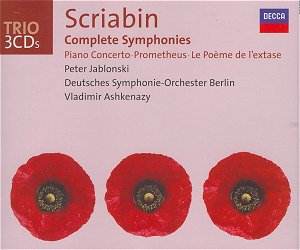Universal
continue to pour out reissues at attractive prices. On the bargain
shelves this is difficult to resist if you are intrigued by the
repertoire.
I
detect something of a dichotomy when it comes to Scriabin. Are
there, as I suspect, two distinct audiences - one for the piano
solo music and another for the orchestral music. The piano solos
have been lapped up by the connoisseurs. The self-indulgent fringe
has tended to gravitate towards the sprawling mystical romance
of the orchestral works. The connoisseurs may well choose to look
somewhat pityingly on those who indulge a louche taste for the
magniloquence of these fervent monuments to egoism reaching for
the unattainable. If I am right in these completely evidence-absent
speculations then these two audiences hardly ever meet.
Of
the Inbal (Frankfurt RSO Philips Duo 454 271-2), Muti (EMI Classics
7243 5 67720 2 1), Ashkenazy triumvirate Muti best captures the
hedonism and mystical rapture of Scriabin. This is apparent time
and again. Listen to the exotic soup of the wistful and the hysterical
in the plunging and then musing Allegro (tr. 5) of the First Symphony.
I have always loved the Allegro movement ever since hearing the
Svetlanov recording in the early 1970s. The romantic flames are
fanned with more well placed impetuosity by Ashkenazy than by
Muti.
Of
course Muti also has the Stokowski/Ormandy ‘instrument’ at his
bidding and this does make a difference. The Ashkenazy’s Berlin
orchestra is capable and fully committed but they are not even
the city’s first orchestra. The Muti set was recorded from 1985
to 1990 while the Ashkenazy dates from 1990-1995 and has a little
more immediacy even though the Berlin orchestra's massed violins
lack the lustrous sheen of the Philadelphians.
There
are two works here that do not fit the mystic-exotic ‘shoe’. The
early Reverie might easily be by Balakirev or Arensky. The other
is the Scriabin Piano Concerto. This is a national treasure of
a work - full of glorious melodies and creative coups. I have
heard it compared with Chopin but it is much better than either
of those two concertos. In the right hands it is the quintessence
of the romantic spirit written before egoism took hold. The Postnikova
version on Chandos is very good in this respect, as reportedly
is Garrick Ohlsson's version on Supraphon. I first came to know
the piece from an old EMI-Melodiya LP which had the piece played
by Heinrich Neuhaus. This is the version on which I imprinted.
The
Muti set was always hampered by the absence of the Piano Concerto
which for me remains one of the joys of the Scriabin catalogue.
Jablonski lacks something in poetry but is by no means insensitive
and this certainly gives the edge to Ashkenazy. Ashkenazy’s Second
and Third Symphonies as well as Prometheus are given combustible
and volatile readings and the recording quality is good but Muti
alluringly delivers greater allure and a much stronger sense of
the yield and grip of the moment. There is not a gulf of difference
between the two but enough to make a recommendation in favour
of the EMI in a straight stand-off between the two. If you were
to be guided by generosity of coverage then I do not see anyone
feeling cheated by the Decca set. The performances are certainly
more than capable. In addition if you wanted to push the boat
out further into speculative waters then Ashkenazy and the Deutsches
Symphonie-Orchester Berlin have also recorded a three CD set of
Scriabin’s preparation for The Final Mystery (Decca 466 329-2)
in a realisation/completion by Alexander Nemtin. Heady stuff if
not consistently inspired and inspiring.
Those
with tolerant ears and minds aspiring to Slavonic intensity and
wild-eyed heady spontaneity have no choice. They should straightaway
track down the four Boheme CDs of Scriabin’s symphonies, piano
concerto and poems conducted by Nikolai Golovanov. However these
are in mono and some people may object to the sound which dates
back 1946-1952. For Scriabin aficionados these CDs form an essential
appendix to the modern recording of choice. The serials are: 1.
CDBMR907-081; 2. 907082, 3. 907-083, Concerto: 908087. Golovanov’s
pianists in the concerto are Genrikh Neigauz and in the Prometheus
Alexander Goldenweizer. Hall of Fame recordings. Boheme have
made a superb job of processing the sound on these recordings
now between forty and fifty years old.
The
Ashkenazy is the ideal choice for those who find Scriabin too
consistently hysterical. Ashkenazy applies the emotional brakes
- not so hard as to bleach out the emotion but enough to denote
some control. In any event a most generous set that will certainly
satisfy. Personally though I still side with the Muti and with
the unmissable yet primitively recorded Golovanov.
Rob
Barnett
see
also review by Michael
Cookson
